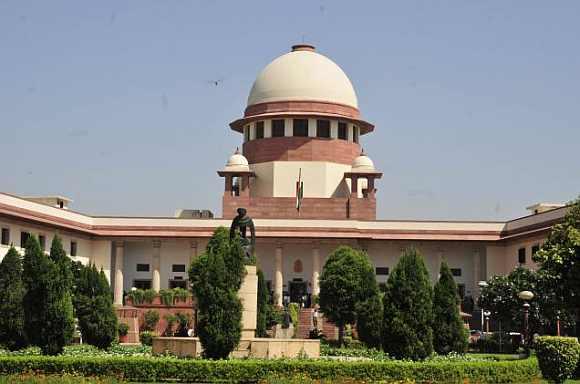 The Supreme Court on Friday had a word of caution for the government that any deviation from its stand that the issue of Indian Prisoners of War languishing in Pakistani prisons cannot be taken to the International Court of Justice, will have its own ramifications.
The Supreme Court on Friday had a word of caution for the government that any deviation from its stand that the issue of Indian Prisoners of War languishing in Pakistani prisons cannot be taken to the International Court of Justice, will have its own ramifications.
"The government of India's stand has been that the issue cannot go to the ICJ. Can it change the stand now? It will have its own ramifications," a bench comprising Chief Justice T S Thakur and R Bhanumathi observed.
The remarks came after the bench wanted to know from the government’s counsel R Balasubramanian whether the ICJ has any jurisdiction to go into the issue.
He said the Centre has taken a stand that the ICJ has no jurisdiction on the issue. The bench was told that in the past, Pakistan had taken some of the issues to the ICJ.
The bench was hearing a batch of petitions raising the issues of POWs, the brutality meted out to Saurav Kalia during the Kargil War and the beheading and mutilation of bodies of two Indian soldiers in 2013 by Pakistani army, for a direction to the union government to move the ICJ.
It was also hearing an appeal filed by the Centre challenging the Gujarat high court order directing the Union government to move the ICJ on Pakistan illegally detaining 54 Indian armymen in breach of an agreement between the two countries after the 1971 war to exchange all POWs.
The bench on Friday admitted the appeal of the Centre against the high court order. The apex court had in 2012 stayed the Gujarat high court order.
The bench, on September 1 last year, had expressed concern over the status of 54 Indian POWs languishing in Pakistani jails since 1971.
The court had directed the government to pay the salary and retirement benefits to the dependents of the PoWs, to which the law officer had said this was being done.
During the last hearing, in response to a query as to why India cannot take the matter of the PoWs to the ICJ, the government had said India has not submitted itself to the jurisdiction of the ICJ if the matter relates to armed conflict between it and Pakistan.
Moreover, India had once successfully blocked such a bid by Pakistan, the government had said when the bench referred to the fact that once the water dispute between the two countries was taken up before the ICJ.
The Centre had said Indian authorities had tried from all channels to ascertain facts about 54 PoWs, but Pakistan was not accepting that they are in their country.
The Ministry of Defence, in its affidavit last year, had informed the court that it has no details regarding 54 missing POWs in Pakistan jails after 1965 and 1971 wars.
It had also said it cannot even identify three such army personnel since their service records, unit and family details were not known.
Of the 54 missing personnel, 27 were from the Army, 24 from the Air Force, two from the Navy and one personnel from the Border Security Force, it has said, adding that while 48 out of the 54 were missing since the 1971 war, three had gone missing in the 1965 war.
The affidavit was filed in response to a query by the court which wanted an updated status on the PoWs languishing in Pakistan jails following the two wars.
The court had referred to the case of Pakistan raising in the ICJ the issue of downing of its spy aircraft in August 1999 by Indian forces despite New Delhi’s objection which was upheld by the international tribunal.
The government had said it cannot refer these cases to the ICJ as India is governed by a bilateral agreement with Pakistan based on the 1972 Shimla agreement.











 © 2025
© 2025